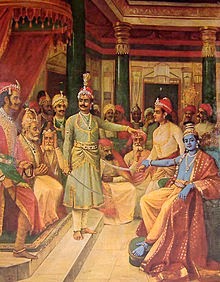Shikhandi was originally born as a girl child named 'Shikhandini' to Drupada, the king of Panchala.
Shikhandi had been born in an earlier lifetime as a woman named Amba. Amba was the eldest daughter of King of Kashi, Kashiraj. Along with her sisters Ambika and Ambalika, she was taken by force by Bhishma from their Swayamvara. He presented them to Satyavati for marriage to Vichitravirya, the king of Hastinapur.
[2]
Vichitravirya married only her sisters, because Amba told Bhishma that she had been promised to the Subalu, the King of Salva and was not ready to marry anyone else. Hearing this from her, Bhishma sent Amba with grandeur Salva's place. But Salva rejected her as well, in shame of losing the combat against Bhishma at the Swayamvara. Amba then returned to Bhishma and demanded that he marry her. He declined since he had already taken a vow of celibacy.
Enraged that she was going to be an unmarried woman, she swore to kill him.Amba was reborn as Shikhandini, the daughter of King Drupada.According to Vyasa Mahabharata Shikhandini exchanged her sex with a Yaksha who wanted to be a female.Thus Shikhandini became Shikhandi.
In the battle of Kurukshetra, Bhishma recognised him as Amba reborn, and not wanting to fight 'a woman', lowered his weapons. Knowing that Bhishma would react thus to Shikhandi, Arjuna hid behind Shikhandi and attacked Bhishma with a devastating volley of arrows. Thus, Shikhandi's role was instrumental in Bhisma's death.
Shikhandi was finally killed by Ashwatthama on the 18th day of battle.
 |
| Bhishma refuses to fight Shikhandi |











